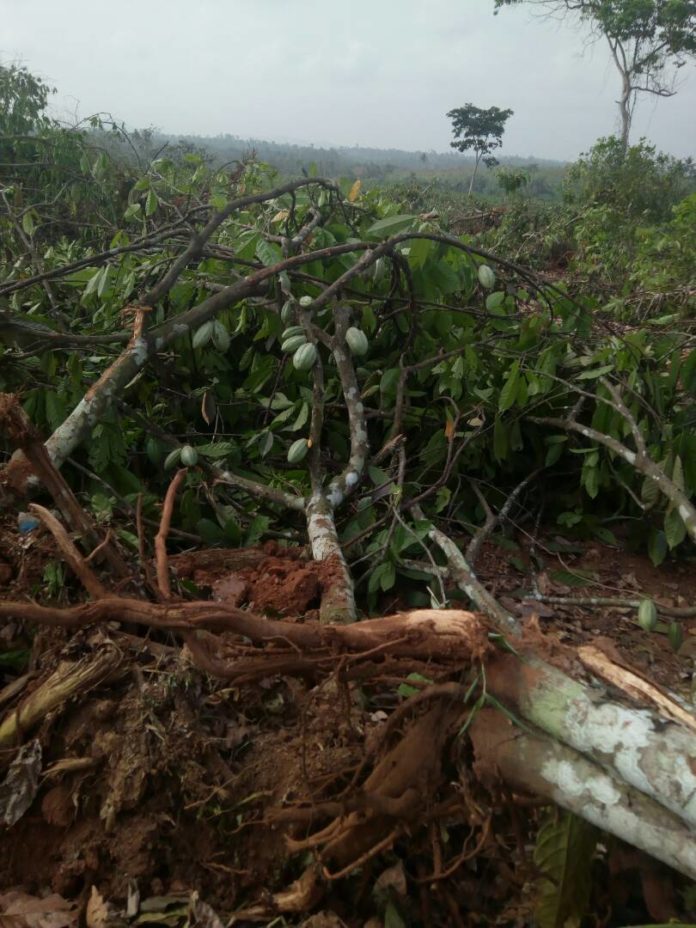Ghana’s cocoa is one of the best in the world. It is cultivated in six regions in Ghana: Western, Central, Brong Ahafo, Eastern, Ashanti, and the Volta regions. At its peak, it accounts for about 66% of the country’s foreign exchange.
Due to the high foreign exchange accrued from the cocoa sector over the years, the government introduced a policy to support cocoa farmers by providing fertilizer subsidy, free cocoa seedlings, free mass spraying programme among other interventions needed to boost cocoa production.
The story is however different in the Wassa Amenfi East Municipality of the Western Region of Ghana. About 250, 000 acres of cocoa farms in the following communities Dikoto Junction, Wassa Kumasi, Abaase, Sebeho, Supanso, Appiakrom, Dikoto Krofrom, Ojugu, and Larbikrom among others have been earmarked for destruction by the Chief of Wassa Dikoto if authorities within the cocoa sector do not intervene immediately.
Community leaders say about 4000 cocoa farmers from the 13 cocoa-growing communities in the Dikoto-Nsuaem Traditional Area of the municipality will lose their farms in the coming weeks, as their landlord pushes through his plan to cut down cocoa farms to make way for an Indian company to cultivate an oil palm plantation instead.
This was disclosed during an interaction with members of the Ghana Agricultural and Rural Development Journalist Association (GARDJA) when they visited the 13 cocoa-growing communities in the Wassa Amenfi East Municipality in the Western Region to ascertain challenges confronting cocoa production in the region.
According to the farmers, the traditional ruler, Nana Ntiako Agyiri II, is actively pushing through a plan to establish an oil palm plantation and milling plant as part of his development agenda for the area.
But over four thousand cocoa farmers in the Dikoto-Nsuaem Traditional Area of the municipality vehemently oppose the idea.
Mr. Yaw Bioh, who has over 30 acres of cocoa farm says he does not support any project to cut down cocoa.
“Ghana, famous for its cocoa, at its peak, accounts for about 66% of the country’s foreign exchange; so why should personal interest supersede national interest?
If authorities don’t prevent the Chief and his investors from implementing this initiative; it may lead to conflict and increase poverty” he added.
Madam Yaa Pokuaa said she is shocked at the chief’s decision and fears it would rob her family of the only livelihood they have known for 40 years if nothing is done.
“Nana Ntiako Agyiri’s oil palm plantation project will adversely affect food security in the communities, adding her people have no plans of vacating their ancestral land for the Indian investor” she pointed out.
The chief of Dikoto junction, one of the affected communities, Nana Ayeh Gyampoh III, contended that several appeals to the traditional ruler to reconsider his decision fell on deaf ears, forcing them to petition the paramount chief of the Wassa Amenfi but the petition yielded no positive outcome.
Assemblyman for the Dikoto junction Electoral Area, John Bawuah, confirmed the narrative of the aggrieved farmers, emphasising that almost all the residents are against the chief’s plan.
According to the cocoa farmers and their community leaders, the situation forced them to reach out to EcoCare Ghana, a civil society organisation that specializes in environmental and human rights advocacy issues to intervene which they hope would yield some results in the coming days.
In an interview, Mr. Obed Owusu-Addai, the Managing Campaigner of EcoCare Ghana explained that his organisation took interest in the matter upon realising that the communities are cocoa-producing communities.
“Our inability to prevent the chief and his investors from implementing this initiative may lead to conflict, increase poverty, rural-urban migration, loss of biodiversity, environmental degradation and affect the achievement of the Sustainable Development Goals 1, 8, 13, and 15. It’s a human rights issue and we want to advocate ensuring that their basic human right is not trampled upon.
We know that the chief is converting the land into a mono-cultural oil palm plantation that does not support biodiversity.
Additionally, the Economic Plant Protection Act of 1979 says that cocoa is an economic plant and you cannot just cut it without recourse to COCOBOD and the laws of the state.
He might have his right to the land as the overlord, but his right is also within the greater context of Ghana as a whole.
EcoCare Ghana is not against the developmental agenda of the chief but he should not trample upon the rights of the indigenes and the migrants on the land.
We also hope that it should not be something that will bring environmental challenges to the people staying in these cocoa-growing communities” he pointed out.
Leaders from the 13 affected communities with support from EcoCare Ghana have petitioned the Wassa Amenfi East Assembly, District Administration of Ghana Cocoa Board, and the Forestry Commission on the matter.
The Municipal Chief Executive of the Assembly, Mr. Frederick Korankye, received the group’s petition and pledged to engage the parties for an amicable resolution.
“I admit the fact that Wassa Amenfi is known for cocoa farming. It’s our major occupation in this municipality and I will do my best to see how we can resolve this issue” he added.
Meanwhile, the Chief of Dikoto, Nana Ntiako Agyiri II has declined comment on the accusations against him.








